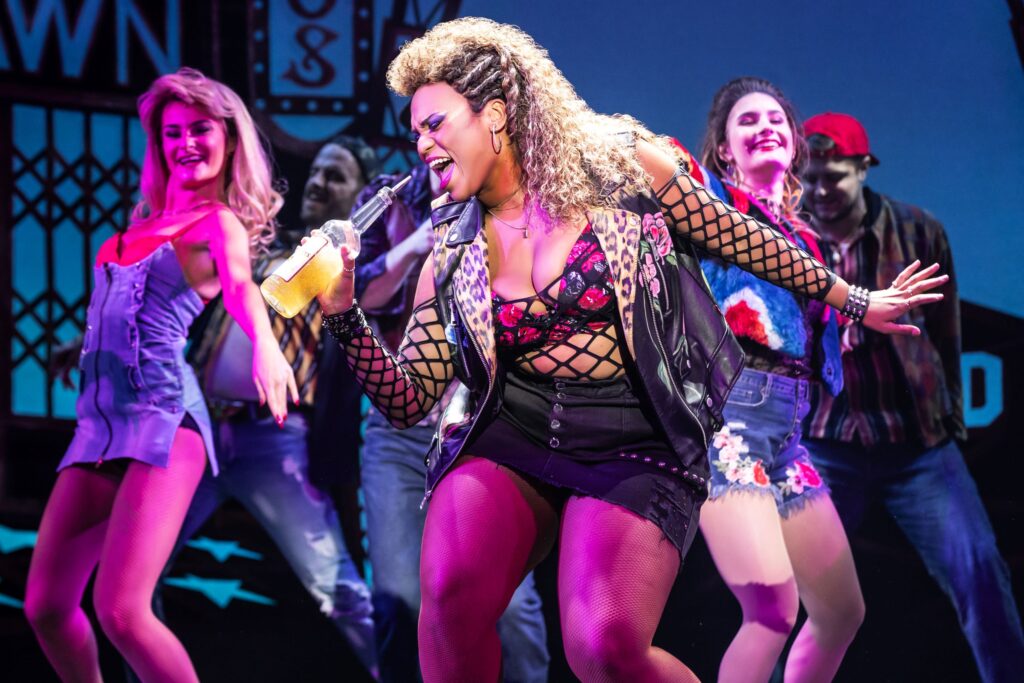
You won’t believe it, but it’s the truth: there is a good time to be had at Pretty Woman: The Musical. Like hiring a street walker for a night of fun, however, you’re going to have to be willing to overlook a few things.
This Broadway Across Canada touring production, much like our prematurely warm weather this week, has swept into Montreal in an attempt to turn up the heat at Salle Wilfrid-Pelletier. It stars an attractive cast of hard-working performers with energy to spare and strong voices to back them up. And yes, it retells the love story of a wealthy man and spirited redhead famously embodied by Richard Gere and Julia Roberts back in 1990. There are songs courtesy of Bryan Adams and Jim Vallance, a few high kicks and plenty of longing looks over the course of its two acts. Unfortunately, there isn’t much by the way of inspiration.
This show has, almost word-for-word, the exact same script as the movie, sans the big budget sets to distract the eye. Even for a touring production, Pretty Woman seems to have spared all expense to create the illusion of Beverly Hills in the early ‘90s. Four glowing palm trees frame the stage at all times, a couple of curtains descend from the rafters to suggest a hotel lobby and a few small set pieces roll in and out to approximate different locations. As one audience member put it, they’d seen more elaborate staging from theatre school productions.

Thankfully the aforementioned cast is quite strong. Ellie Baker stars as young Vivian Ward and has a clear voice, genuine appeal and an adorkably snorty laugh. Chase Wolfe fares slightly better as the uptight-yet-soulful Edward Lewis, delivering power ballads with a raspy tone reminiscent of the rock stars of the era. The duo don’t exactly spark off each other as Roberts and Gere famously did – who could, really? – but they try to make the characters their own as much as possible and for that, deserve praise.
The two biggest standouts, however, are Rae Davenport as Kit, whose Patti LaBelle-worthy riffing elicited spontaneous cheers of appreciation, and Sarah Wang, who emerged from the ensemble to deliver a flawless and all-too-brief operatic soprano solo.
Truthfully, if the show were to suddenly stop and turn into an impromptu cabaret act for these two gifted vocalists, the sparse Montreal audience on opening night made it clear they wouldn’t mind it one bit, considering how little else there was to get excited about.

Some might call this paint-by-numbers adaptation a big mistake – huge, even – but the problem isn’t so much the idea as the execution. Plenty of beloved films have made their way to the Great White Way in recent years, including Ghost, Tootsie, Legally Blonde, Mrs. Doubtfire, Sister Act, Big Fish, Beetlejuice and Back To The Future. A couple have found success while the rest closed on Broadway in a matter of months, in spite of them each having built-in audiences. The deciding factor seems be whether or not staging the material with music as a storytelling device elevates the experience.
Pretty Woman, as directed by Garry Marshall, was always a quiet, intimate picture about two lost people finding each other and ultimately, themselves. It’s a story best told in close-ups, making the challenge of staging it for hundreds of people in large theatres a bit daunting. Director Jerry Mitchell opts to insert dance sequences wherever possible and scale up the attitudes of the characters, resulting in something more akin to children’s theatre than a compelling tale of adult lust and self-discovery. The sometimes hammy presentation changes the tone of the story considerably and throws things off-balance. Simply put, if a frolicking bellhop is more entertaining to the crowd than the smouldering leads, there’s a big problem.
One would hope the music might underscore the complex emotions Vivian and Edward experience as their unusual courtship progresses, but that’s sadly not the case. Bryan Adams’ sometimes tuneful songs often bring the narrative to a screeching halt, like a boom box suddenly being turned on and off at random intervals. The radio-friendly-yet-vague lyrics are miles short of Sondheim, and sometimes so detached from the story they even contradict what’s happening.
The Act One closer, You’re Beautiful, involves the cast reminding Vivian of her worth now that she is wearing expensive designer clothes, even though she never lacked confidence and Edward valued her before she had a fancy wardrobe. Then, Viv’s big Act Two ballad I Can’t Go Back includes the line “I ain’t Cinderella/Who’d want to be anyway,” even though she tells Edward she will settle for nothing less than the full fairytale treatment from him.

Even her opening number gets things off on the wrong foot, with the heroine declaring she’d rather be Anywhere But Here. If the character already knows she should leave town and abandon her current occupation before the story has even begun, has she not already completed her full arc? The show tries to suggest she has an epiphany as a result of her time with Edward, but clearly that’s not the case if her first and last solo both express essentially the same sentiment. Different lyrics would have avoided these issues entirely, but the musical seems to think nobody will notice so long as the costumes match the ones from the movie.
Crucially, Edward’s arc in the film included him processing his grief over the passing of his emotionally distant Dad by helping an elderly entrepreneur reinvent his business. The musical sadly de-ages this character, depriving Edward of the chance to earn the respect of a pseudo-father figure. Of all the alterations to make, why this one? Why strip layers away from the characters when there was room to explore them even more?
It’s worth noting that early treatments of Pretty Woman were much darker than what made it to the screen, with Vivian being left in the gutter by Edward after the conclusion of their weeklong “business arrangement”. Given that the public is now increasingly aware of the traumas associated with sex work and far less tolerant of how men in positions of power manipulate and abuse young women, it sure would have been nice for the creative team behind the musical to be brave enough to explore some of what the movie didn’t. With almost two and a half hours to fill, there was ample opportunity to flesh-out the experiences of Vivian and her fellow call girls in a more realistic, nuanced way. Or at the very least, devise some reasonable explanation for why a young woman so capable, witty and attractive couldn’t make the rent selling cosmetics at a department store instead of selling herself.

In spite of Wolfe’s beautiful delivery of the Bryan Adams classic Freedom, this show doesn’t give itself any permission to be different from – or better than – the movie. Like its heroine, it walks the same path afraid to try something new and is poorer for it.
That said, nostalgia is a powerful drug. If you’re in the mood to revisit a beloved classic in a new format that still keeps things familiar, this musical is, as Vivian would put it, “a sure thing”.
Pretty Woman: The Musical continues its run at Salle Wilfrid-Pelletier in Montreal until Sunday, March 10th, then moves on to Chicago, Illinois from March 12-17, is in Syracuse, New York from March 19-23, and continues through the US until the end of May. Find out when it is coming to a theatre near you and how get tickets at prettywomanthemusical.com
All photo credits : Matthew Murphy for MurphyMade

While I enjoyed the show, I agree with you on most of your points. I haven’t seen the movie in years, so I wasn’t aware of the similarity in dialogue and costumes, but I did find that the the musical lacked soul or some kind of oomph. It was good…just good. I absolutely agree about Sarah Wang, I was blown away by her voice. None of the songs stuck in my head, none were really catchy, but the vibe was good all the same. All in all, I give it a solid 7/10, and I’m glad I saw it, but wouldn’t see it again.